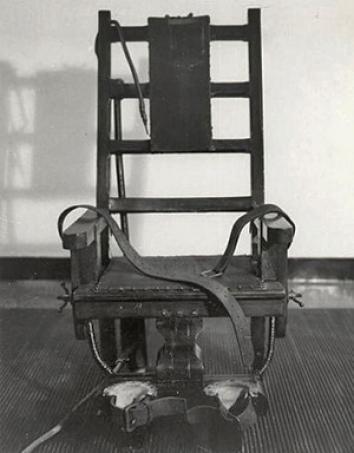We hear a lot about the racial disparity in death penalty sentencing, namely, that black Americans are dramatically overrepresented on death row.
Less remarked on is the disparity in death penalty support, as revealed in a new Pew Research Center survey. Overall, 55 percent of Americans support capital punishment, and 37 percent are opposed. Among whites, however, support for the death penalty jumps to 63 percent, compared to 40 percent for Hispanics and 36 percent for blacks.
Religion—or at least, Protestantism—seems to increase the divide. At 67 percent in favor, white evangelical Protestants are more likely than any other group to support the death penalty, followed closely by white mainline Protestants (64 percent). Catholics are the least likely among religious whites to support capital punishment, though 59 percent are still in favor. On the other end, religious blacks and Latinos are even less likely than their peers to support the death penalty.
Before we get into why whites are so supportive of the death penalty, it’s important to remember this: There’s no separating capital punishment from its role, in part, as a tool of racial control. As Stuart Banner explores in his book The Death Penalty: An American History, one of the earliest American-made capital statutes—as opposed to ones borrowed from England—was passed in New York in the aftermath of a 1712 slave revolt.
Likewise, in Southern colonies like Virginia and South Carolina (where enslaved blacks were close to half the population), legislatures imposed the death penalty for a long list of offenses. For blacks to do anything to interfere with their enslavement was to court death. “In 1740,” writes Banner, “South Carolina imposed the death penalty on slaves and free blacks for burning or destroying any grain, commodities, or manufactured goods; on slaves for enticing other slaves to run away; and on slaves maiming or bruising whites.” He continues:
Virginia, fearing attempts at poisoning, made it a capital offense for slaves to prepare or administer medicine. The Georgia legislature determined that crimes committed by slaves posed dangers “peculiar to the condition and circumstances of this province,” dangers which meant that such crimes “could not fall under the provision of the laws of England.” Georgia accordingly made it a capital offense for slaves or free blacks to strike whites twice, or once if a bruise resulted.
These sentences weren’t always carried out—slaves were valuable!—but the point was to create fear and discourage active rebellion or violent resistance.
Move forward a century, and you have a retrenchment of capital punishment in the Southern states, even as their Northern counterparts moved away from the practice. By the middle of the 19th century, notes Banner, the death penalty had been removed from “crime after crime until none of the northern states used it for any offense other than murder.”
By contrast, in Louisiana—reflecting the incredible tension over slavery and existential fear of revolt—“it was a capital crime to print or distribute material, or to make a speech or display a sign, or even to have a private conversation, that might spread discontent among the free black population or insubordination among slaves.” North Carolina had similar laws, imposing the death penalty for—among other things—“concealing a slave with intent to free him” and “circulating seditious literature among slaves.” What’s more, most Southern states punished attempted rape with death if the defendant was black and the victim white.
Wide use of the death penalty against blacks would continue through the 19th century and into the 20th, pushed by Southern whites who saw capital punishment as necessary to restrain a dangerous black population. “If the death penalty were to be removed from our statute-books,” explained former Arkansas governor George Hays in 1927, “the tendency to commit deeds of violence would be heightened owing to this negro problem.” One pro-lynching activist, speaking in 1897 during the heyday of lynching—an extrajudicial form of capital punishment—was more explicit: “If it takes lynching to protect woman’s dearest possession from drunken, ravening human beasts … then I say lynch a thousand a week if it becomes necessary.”
Indeed, it’s noteworthy that as late as 1954, rape was a capital offense in every state of the former Confederacy, and five retained the death penalty for arson. Even now, most executions happen in the South, and Southern whites continue to show strong support for capital punishment.
Our cultural attitudes are unconsciously shaped by our collective history as much as they are consciously shaped by our current context. When you consider the death penalty as a tool of racial control—a way for whites to “defend” themselves from blacks—then Pew’s poll results make sense. What we’re looking at is the inevitable result of that history expressed through public opinion, and influenced by racialized ideas on crime and criminality.
If you’re still skeptical, consider this: In 2007, two researchers tried to gauge racial differences on capital punishment and assess how blacks and whites responded to arguments against the practice. Their core findings with black Americans weren’t a surprise—in general, blacks were receptive to any argument against the death penalty.
Their findings with whites, on the other hand, were disturbing. Not only where whites immune to persuasion on the death penalty, but when researchers told them of the racial disparity—that blacks faced unfair treatment—many increased their support.
It sounds glib, but if you needed a one-word answer to why whites are so supportive of the death penalty, “racism” isn’t a bad choice.
